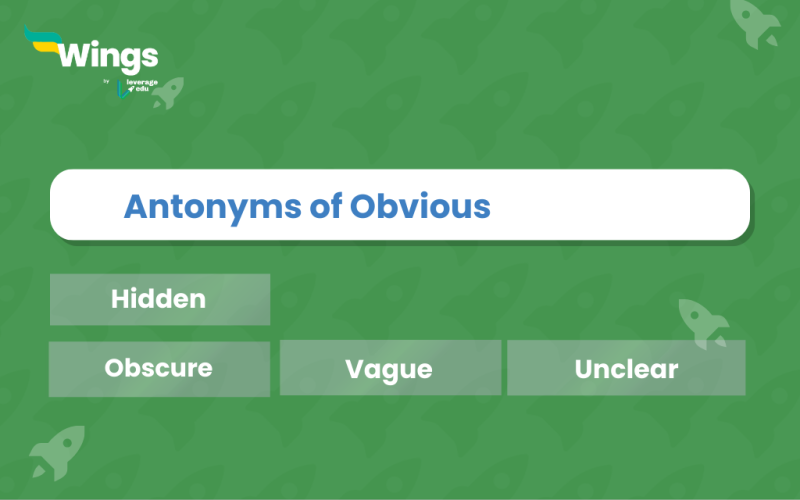‘Obvious’ means something that is clearly evident and understood. We see this word commonly in our daily language. However, it is also important to understand the antonyms of ‘obvious’ that you can use to show that something is not clearly understood to you. Some common antonyms of obvious are hidden, obscure, unclear, and vague. Let us understand the meaning of ‘Obvious’, its meaning, origin, antonyms, and its usage with examples in the article blog below.
This Blog Includes:

Meaning and Origin of Obvious
The word “obvious” is used to describe something that is clear or easy to understand without needing further explanation. When something is obvious, it can be seen, understood, or recognised at once.
The term comes from the Latin word obvius, which means “in the way” or “easily encountered.” It is formed from ob (towards) and via (way or road). Originally, it referred to something that stood directly in one’s path and could not be missed.
Over time, the meaning evolved from a physical sense to something literally in front of you, to an intellectual one. Today, obvious is commonly used to describe facts, ideas, or outcomes that require little thought to grasp because they are clear or self-evident
13+ Opposites of Obvious
Let’s take a look at the following opposites of obvious to expand your understanding of the word:
- Hidden
- Obscure
- Ambiguous
- Cryptic
- Unnoticeable
- Unclear
- Vague
- Subtle
- Imperceptible
- Enigmatic
- Clouded
- Indistinct
- Imprecise
- Sketchy
- Hazy
Must Read: Antonyms of Stare, Meaning and Examples
Antonyms of Obvious Examples With Usage
The term obvious is often subjective and can vary depending on the context and perspective of the speaker. Let us understand the following examples of using the antonyms of obvious in a sentence:
- Hidden: He found a hidden treasure in the valleys.
- Obscure: She left his job for some obscure reason.
- Ambiguous: She gave an ambiguous answer.
- Cryptic: She got a cryptic message from his friend.
- Unnoticeable: His clothes were simple and unnoticeable.
- Unclear: She is unclear on a few points.
- Vague: She has a vague sense of guilt.
- Subtle: I like subtle shades of grey and blue.
Also Read: Antonyms of Improve, Meaning and Examples
Antonyms of Obvious Quiz
Here, we have mentioned a quiz on the antonyms of Obvious to check your understanding of this concept.
1. Which of the following is an antonym of “obvious”?
A. Clear
B. Evident
C. Hidden
D. Plain
Correct Answer: C. Hidden
2. Which word means “not easy to notice or understand”?
A. Obvious
B. Apparent
C. Obscure
D. Visible
Correct Answer: C. Obscure
3. Choose the opposite of “obvious” in meaning.
A. Open
B. Subtle
C. Clear-cut
D. Noticeable
Correct Answer: B. Subtle
4. Which word is closest to the antonym of “obvious”?
A. Plain
B. Evident
C. Apparent
D. Concealed
Correct Answer: D. Concealed
5. Which option describes something that is difficult to detect?
A. Clear
B. Obvious
C. Hidden
D. Visible
Correct Answer: C. Hidden
6. What is the opposite of something that is “obvious to everyone”?
A. Apparent
B. Obscure
C. Clear
D. Plain
Correct Answer: B. Obscure
7. Which word suggests something not immediately understood?
A. Evident
B. Subtle
C. Clear
D. Obvious
Correct Answer: B. Subtle
8. Identify the antonym of “obvious” from the options below.
A. Transparent
B. Plain
C. Covert
D. Visible
Correct Answer: C. Covert
9. Which word best describes something kept out of sight or awareness?
A. Obvious
B. Evident
C. Hidden
D. Clear
Correct Answer: C. Hidden
10. Which of the following is NOT a synonym of “obvious”?
A. Apparent
B. Clear
C. Obscure
D. Evident
Correct Answer: C. Obscure
FAQs
The opposite of obvious is hidden, obscure, or subtle. These words describe something that is not easily seen, noticed, or immediately understood.
Yes, hidden is an antonym of obvious because it refers to something concealed or not easily noticed, unlike something that is clear and easily seen.
The opposite of apparently can be secretly, unclearly, or doubtfully, as these suggest uncertainty or lack of clear appearance or evidence.
No, oblivious is not the opposite of obvious. Oblivious describes a person unaware of something, while obvious describes how clear or noticeable something is.
An antonym for oblivious is aware, attentive, or conscious, as these words describe someone who notices and understands what is happening around them.
Explore More Exciting Reads Below
This was all about the antonym of “obvious”, meaning and examples. Hope you understand the term obvious and its usage. For more such blogs, follow Leverage Edu.


 One app for all your study abroad needs
One app for all your study abroad needs












 60,000+ students trusted us with their dreams. Take the first step today!
60,000+ students trusted us with their dreams. Take the first step today!